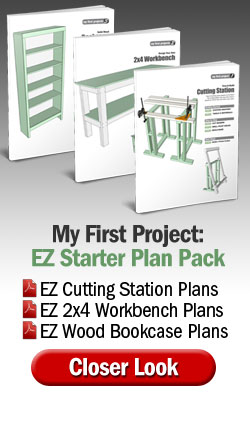
3-4-5 Triangle RuleI have no problem laying out the projects I build in my shop. The squares and triangles I own do a nice job of keeping everything straight and square. But building something in the backyard is a different story, especially with large projects like patios, decks, and sheds. The layout tools I use in the shop are of no help here. They're just too small. And unless you have your own surveying tools, getting a straight and square footprint can otherwise be a challenge.
That's why I use an old geometry trick called the 3-4-5 triangle rule to lay out my backyard projects. It's something that carpenters have relied on for centuries to get the job done. The critical step here is making sure your footprint is straight and square, and that's where the 3-4-5 trick comes in. But before we get started, I want to suggest that you make a few gadgets to simplify the job.
What you're looking at here are three pieces of string with an eyelet tied to each end.
In just a minute, you'll see how these pieces of string come in very handy for laying out a nice, straight and square footprint.
Now the first step of the 3-4-5 trick is to establish one side of the footprint. I like to start with the front. Keep in mind that the first line you draw here will determine which way your project faces in the yard, so choose this location carefully.
Bring the 5 foot and 4 foot strings together, pulling both strings tight as you make the ends meet, then mark this spot with another nail. This creates a perfect 90 degree angle. Now we'll use the location of that nail to help us draw a straight line to whatever depth you chosen for the project. Be sure to mark that spot with another nail.
Just as we did earlier, take your 3-foot string and attach one end to the back corner and pull the string taught. Then mark the spot with another nail. Bring the 4 foot and 5 foot strings together, pulling both strings tight as you make the ends meet. Mark the spot with nail. Once again, another perfect 90 degree angle.
Now draw the back side of the footprint. If your footprint is a square or rectangle, the back side will of course be the same length as the front.
A good way to double check the accuracy of your footprint is to compare the distance between opposite corners. If your footprint is perfectly square, both measurements will be the same. If not, slightly adjust the location of the corners until both measurements are identical. |
|




